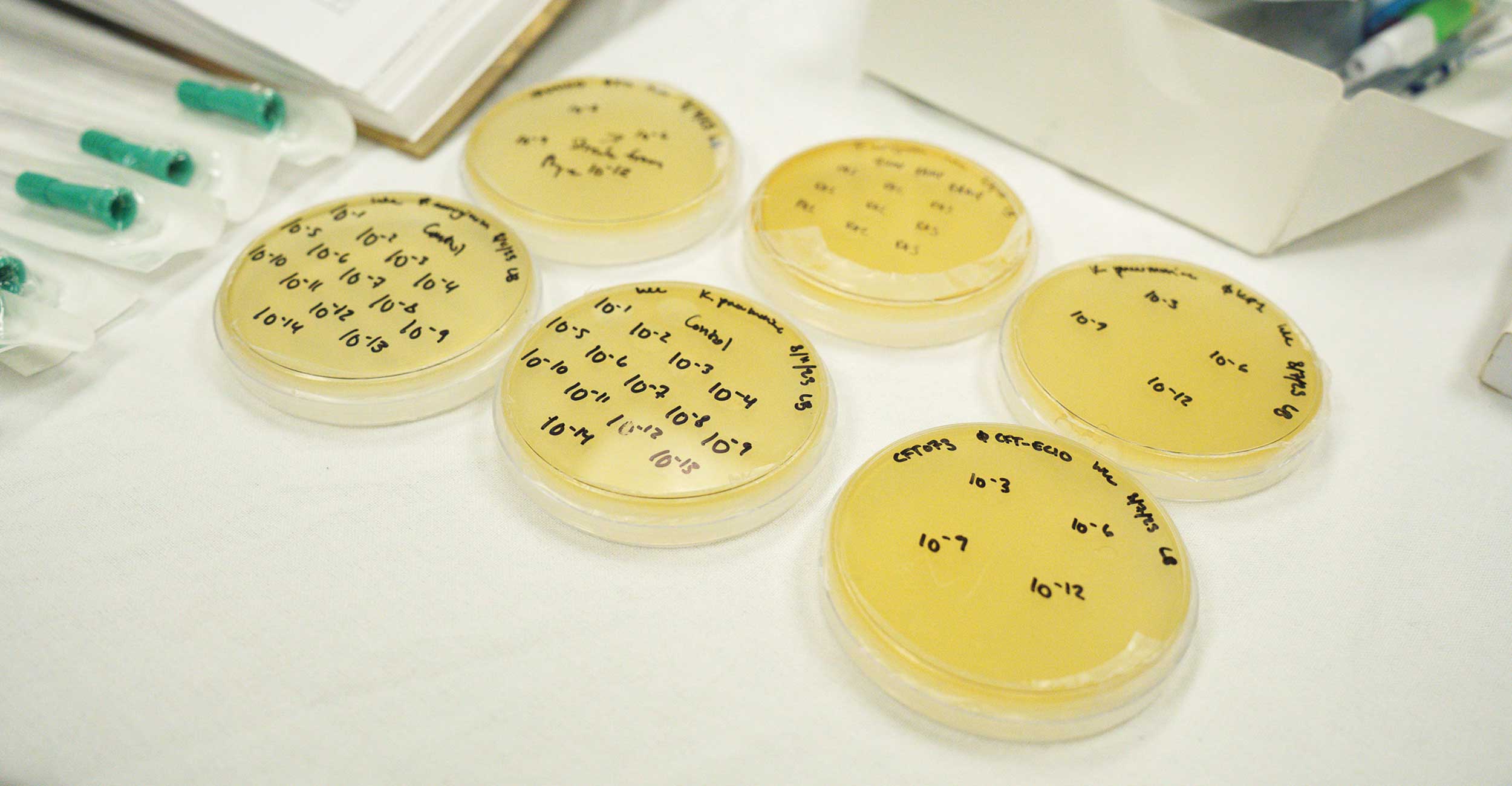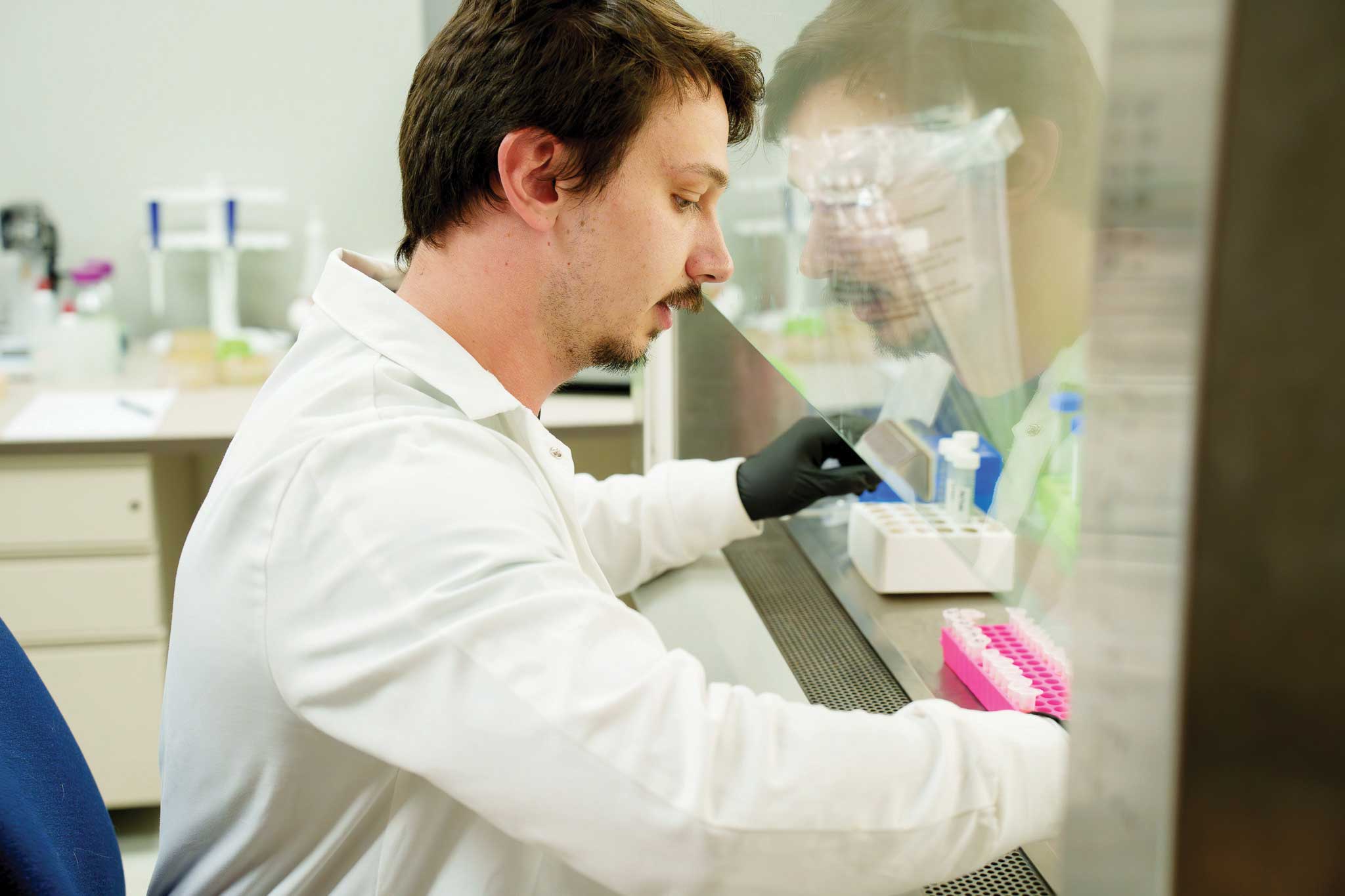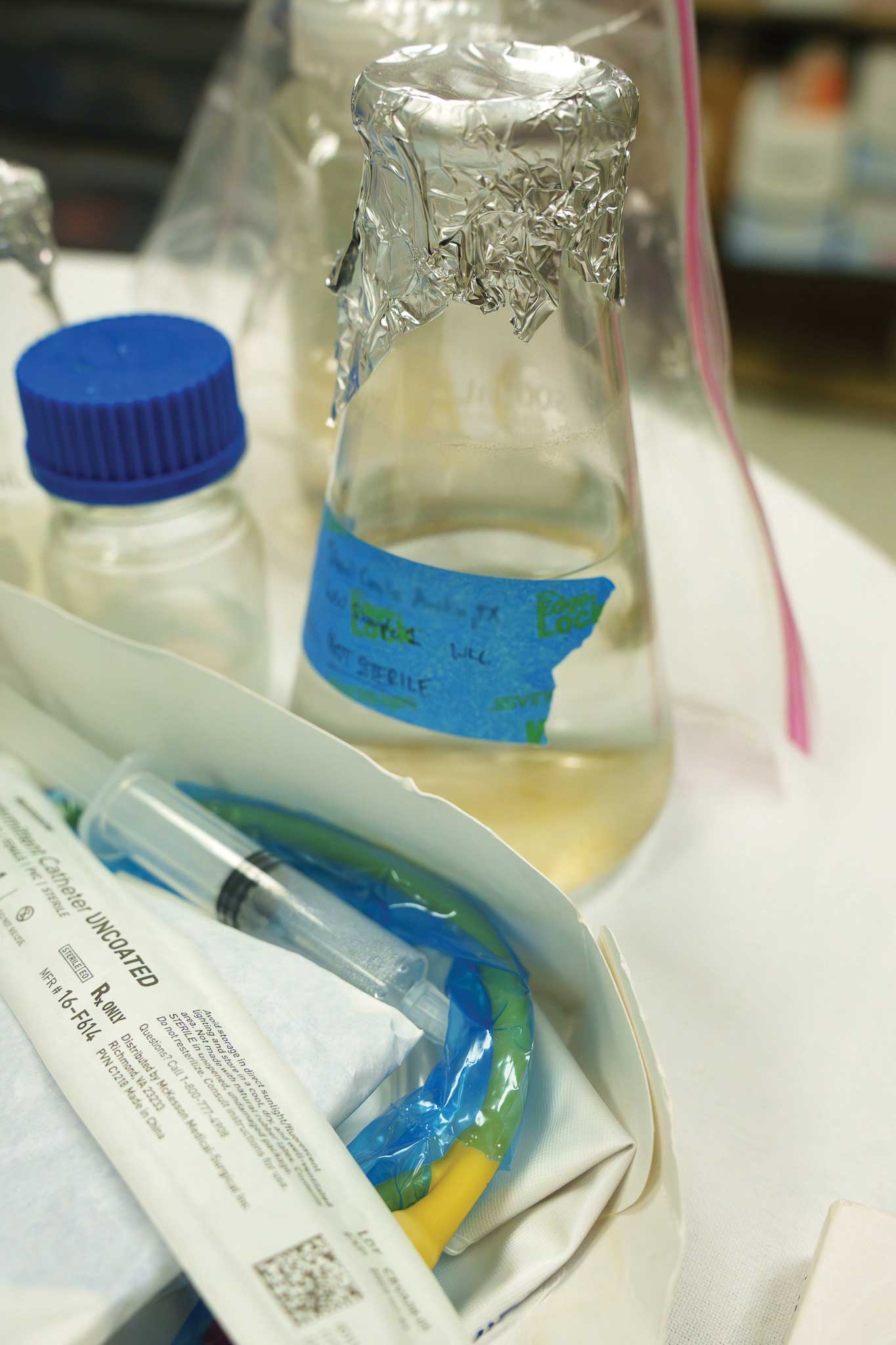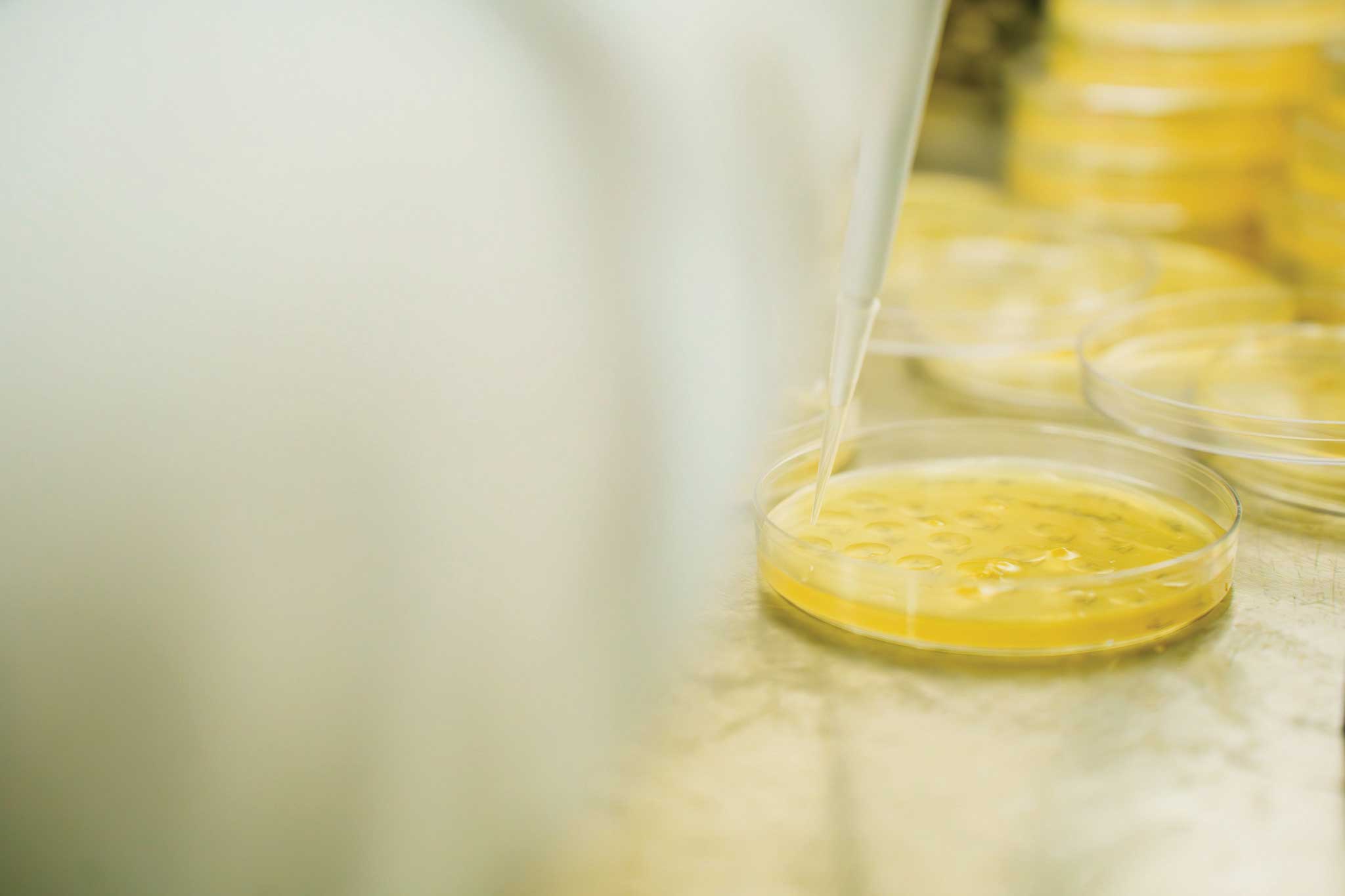
OSU graduate turns idea into potentially lifesaving business with Riata Center Support
Friday, September 13, 2024
Media Contact: Mack Burke | Associate Director of Media Relations | 405-744-5540 | editor@okstate.edu
William Colton had a life-changing conversation when he wandered into the Riata Center inside the Spears School of Business as an Oklahoma State University sophomore.
Colton typically passed the new, crescent-shaped Business Building while walking to his microbiology and molecular genetics classes during the fall 2018 semester. This time, he had a reason to step through the glass doors and approach the Allen Family Genius Bar, where students with business ideas seek expert advice.
OSU entrepreneurship professor David Thomison was behind the counter that day. When he heard Colton’s proposal, the Spears Business faculty member with an MBA from Harvard quickly realized his potential.

“I’ve had students constantly walk up with ideas, but they’re not usually of this scientific magnitude,” Thomison said.
It reads like the beginning of a groan-inducing dad joke: a microbiology student walks up to a bar where ideas are served in lieu of drinks. But it was a serious light-bulb moment for Thomison, who immediately asked Colton if he had considered participating in business plan competitions. Since then, Colton has won thousands in prize money, received Mayo Clinic recognition and grown from a young scientist into a business founder who could transform health care.
Colton, the chief executive officer of Paldara Pharmaceuticals, invented a hydrogel coating that prevents bacterial infection, potentially saving lives worldwide.
Thomison and Spears Business students taught him how to market it.
Inventors like Colton make brilliant discoveries, but to truly change the world, these concepts need business strategies behind them. OSU has multiple routes to make this happen. Some inventors go through The Innovation Foundation at OSU, which translates campus research into marketable products and services. As the CEO of a company independent from OSU, Colton took a different path, still with the support of his alma mater.
“You usually only hear about this at Ivy Leagues,” Colton said. “So, it’s really cool to have that kind of ecosystem in Stillwater.”
Through business plan competitions and OSU’s Creativity, Innovation and Entrepreneurship Scholars program, Thomison equipped Colton with the business savvy to carry his brain power far beyond the campus lab where his findings began.
The discovery
Colton learned to use his imagination at an early age.
As a child in Bellaire, Texas, he and his father made up stories about a kingdom called Paldara. Years later, Colton bestowed that majestic name upon a different product of his creativity. Paldara Pharmaceuticals is the parent company of an invention that, for vulnerable hospital patients, could make the difference between life and death.
For Colton, this mission is personal. His grandmother died only a couple of months after developing an infection related to hip replacement surgery, and he strives to protect others from the prevalence of antibiotic-resistant bacteria.
“It’s really an act of compassion in trying to make sure that we keep patients safe,” Colton said.
The ideas began flowing at OSU in Dr. Matthew Cabeen’s lab. When an undergraduate Colton developed a gel harnessing the power of bacteriophages — naturally occurring viruses that attack harmful bacteria — he knew a large market existed for his product.
But he didn’t know how to commercialize the invention.

This is where the Riata Center worked its magic. After years of working with Spears, Colton explains his technology easily and confidently as if he’s delivering a pitch on “Shark Tank,” using analogies that resonate with people outside the scientific world. Although the earliest applications of his product have focused on catheters, the gel is intended for various medical uses.
“Think of it as a new version of Neosporin,” Colton said. “You’re developing a new gel coating for just about anything you’re going to use in or around your body — wound bandages, urinary catheters, implants — and we apply that gel coating over that device. That essentially protects you from infection for seven to 10 days after treatment, specifically from drug-resistant bacteria.”
Unlike Neosporin, Colton’s gel doesn’t rely on antibiotics. The bacteriophages target harmful bacteria but protect the microbiome that benefits humans, he said. Imagine microscopic superheroes swooping into a city to fight villains while keeping the citizens safe.
It happens before the villains have a chance to wreak havoc. Rather than curing infection, Colton found a way to prevent up to 99% of pathogenic bacteria from causing it in the first place, another distinctly appealing quality of his hydrogel.
Thanks to Colton’s innovative approach, his invention has 15 unique patent claims as he works with the United States Patent and Trademark Office to secure legal protection. Thomison recognized this originality when he met Colton at the Genius Bar.
The process
Thomison has a reputation in the Business Building as an entrepreneurship wizard, but his path started quite differently.
Before he advised small business owners in the private sector or earned the distinction of OSU’s George Kaiser Family Foundation Endowed Chair in Entrepreneurship, Thomison wanted to be an engineer. He holds a bachelor’s degree in industrial engineering and management from OSU.
“I went into engineering because I love to create and to build things,” Thomison said. “Then I figured out the most challenging thing in the world to build is a new business.”
For over 10 years, Thomison served as senior vice president of the client services group at i2E, an Oklahoma-based business development organization. With his interdisciplinary background, he knew the pieces Colton needed to make his vision work.
But how did a microbiology and molecular genetics student find himself face-to-face with Thomison at the Genius Bar in the first place?
“You usually only hear about this at Ivy Leagues. So, it’s really cool to have that kind of ecosystem in Stillwater.”
In a serendipitous encounter at an out-of-state medical conference, a patent attorney encouraged Colton to bring his hydrogel idea to OSU’s Riata Center for Innovation and Entrepreneurship. Colton doesn’t know the attorney’s name or how this person knew about the Riata Center, but he took the advice.
“It was great because I could just walk in and go up and talk to someone,” Colton said. “David really taking it seriously from the get-go helped to give me that validation, and it made me comfortable.”
Thomison first conducted an independent study with a team, including Colton, to present the hydrogel invention through an entrepreneurial lens.
Years of hard work followed, and Colton gained real-world experience through business plan competitions, delivering sales pitch after sales pitch with Thomison as a coach. They further collaborated when Colton took Thomison’s CIE Scholars course as a graduate student, partnering with fellow scholarship recipients across campus with the unified goal of refining Colton’s research into an appealing commercial product.
“You’re seeing the polished William, not the William out of the gate with the first one,” Thomison said. “He’s always had an outgoing personality. But he would sell science and features instead of value first. What people care about is, ‘What’s the benefit?’ not, ‘How do you achieve it?’ He’s learned to flip it from a business perspective and lead with the value, not the technology.”
With each competition, Colton realized Thomison was one of many who believed in this value.
The possibilities
Colton’s hopes dwindled as he heard competitors’ names announced for third and second place at the Love’s Cup in 2019. He realized his team might not receive an award, but his debut business plan competition could at least serve as a trial run for his pharmaceutical startup.
Then came the first-place reveal. Paldara Pharmaceuticals won its division, receiving the $20,000 grand prize. The Oklahoma City-based event served as a launchpad for Paldara, which then reached the top 15 at Princeton University’s competition and the top 18 at Rice University.

“It really, really changed my perspective on what I was doing and really focused my mindset on building my business,” Colton said.
It’s a difficult, drawn-out process to create a sustainable company, but Colton has the skills to navigate opportunity and uncertainty. His keen grasp of science and business stands out to people like John Nickel, assistant director of Cowboy Technologies. Nickel’s Innovation Foundation office in Stillwater faces Meridian Technology Center, where Colton works on his invention in a lab reserved for him.
“There is just a tenacity,” Nickel said. “There’s something very different about what he’s trying to do. He has the technical piece, and he also has this sales-entrepreneurial (piece) at the same time, which is pretty rare.”
Medical professionals recognize the vast potential of Colton’s ingenuity, too. While working with Thomison, Colton and his team conducted more than 100 interviews with hospital staff about Paldara, receiving what Colton called “overwhelmingly positive feedback.” The company was selected this March for the prestigious Mayo Clinic and Arizona State University MedTech Accelerator program, where Paldara won a pitch competition and received $5,000 worth of legal services.
The honors are stacking up, and Colton can tap into Paldara’s full potential once he reaches a game-changing step: approval from the U.S. Food and Drug Administration. While working toward that goal, Colton is also taking a One Health approach, partnering with OSU’s College of Veterinary Medicine to gauge the effectiveness of his product in animals.
As Colton continues his discoveries, he needs capital. The funding from business plan competitions and investors has carried Paldara a long way, but there’s more to go. As Thomison knows, starting a business is a leap with risks and rewards.
“He’s either going to be bankrupt in two years, or he’s going to be incredibly wealthy in two years,” Thomison said. “But he’s in the game. And I would bet on him.”
Thomison took a chance. After their momentous meeting, Colton gained the bravery to do the same.
“It really helped to give me a foundation of confidence in how I would go and pitch this business and to believe in myself and what I was developing,” Colton said. “I wouldn’t be here without the support I had from David Thomison and people in the Spears School of Business. It takes a team. It’s much more than just one person. Having that kind of support is what got me to where I am today.”
Accelerating Success
Cowboy Enterprises is an integral part of The Innovation Foundation at OSU, designed to promote entrepreneurship and facilitate the transformation of innovation within the university and community into viable businesses.
It provides the right assistance and funding resources at the right time for students, faculty, alumni and the community to develop and launch their business ideas, contributing to economic development and diversification in Oklahoma.
A key component of Cowboy Enterprises is the Cowboy Innovation Accelerator. This program specifically focuses on accelerating the growth of startup ventures inside and outside of OSU, such as Paldara LLC. It offers a structured environment where aspiring entrepreneurs can refine product/market fit, identify and procure translational funding and prepare for market launch and venture capital raise needs. Another critical component of Cowboy Enterprises is Cowboy Technologies LLC, the for-profit venture capital arm of The Innovation Foundation at OSU. Cowboy Technologies LLC makes returns-based investments in internal OSU technology development projects and growth startups affiliated with OSU, including those licensing OSU intellectual property.
“At the Innovation Foundation, we believe entrepreneurship and collaboration are the cornerstones of economic growth and innovation,” said Elizabeth Pollard, CEO and president of The Innovation Foundation. “The Cowboy Innovation Accelerator exemplifies this by providing OSU and the community with the assistance and resources needed to transform groundbreaking ideas into successful, growth businesses.”
The Accelerator provides a comprehensive suite of resources and support.
Business Model Development through NSF Customer Discovery — Helping teams define their unique value and target customers to achieve product-market fit through the NSF I-Corps program.
EDA University Center’s Commercial Grant Funding Assistance — Providing commercial grant assistance for energy, aerospace, agriculture, and One Health technologies in northeast Oklahoma, focusing on SBIR/STTR grants and other opportunities, supported by the Economic Development Agency’s University Center’s grant.
Cowboy Leaders Network Mentoring and Advising — Providing access to experienced business professionals in technology fields for insights, guidance, and connections to develop successful business models, market strategies and growth plans.
Startup Formation, Registration and Business Operations Assistance — Providing essential business support for startups navigating the complexities of formation, registration and initial operations setup.
Education Workshops and Networking Events — Creating dynamic opportunities for learning and networking, enabling innovators and entrepreneurs to connect with peers and subject matter experts.
Connecting Innovators and Startups with OSU Applied Research Expertise — Bridging the gap between industry and OSU by creating alignment between startups’ needs and OSU applied research capabilities.
Photos: Provided
Story by: Hallie Hart | STATE Magazine
